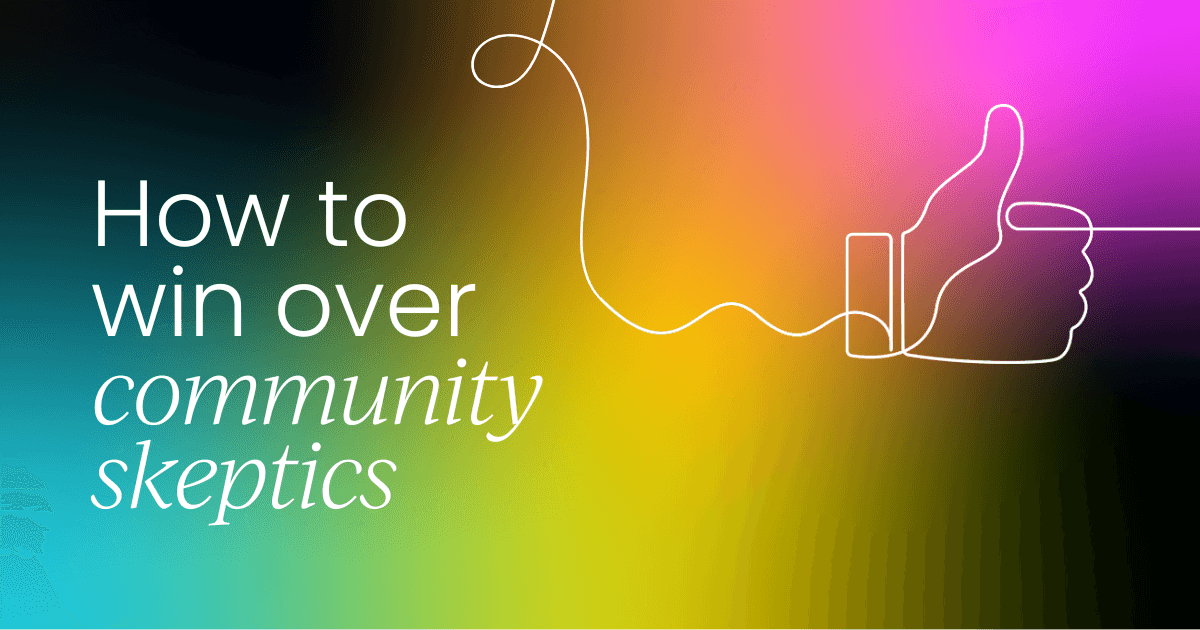If you're trying to build a genuine community in a space full of smart, technical people who've been burned by vendors before, you know exactly what I'm talking about. They see right through corporate speak. They've watched too many companies start promising and end up disappointing.
But here's the thing: those skeptics can become your strongest allies. The loudest critics often care the most. And the communities that seem impossible to crack are usually the ones worth cracking.
When I joined NinjaOne in late 2018, our IT pro audience treated us like just another vendor trying to infiltrate their spaces. Reddit threads about us were brutal. I almost walked away. Almost. But I thought better of it, and instead, I leaned in.
If you’re wondering, “So, how did you do it? How did you shift from ‘don’t engage’ to building genuine credibility and momentum in our community spaces?”
I’ll break it down.
1. Influences matter
We all know it’s infinitely more powerful when someone else, especially a peer or aspirational peer, vouches for you, rather than you doing it yourself. So our first mission was clear: find the cool kids in our space and figure out how to engage with them in a way that’s real, not salesy.
This wasn’t about bribing anyone or pushing partnerships. Our audience is way too sharp for that. Especially in IT, these communities are tough, skeptical, and proud. If you’re going to show up in their world, you’d better bring something of value – and you’d better be doing it because you actually care.
Finding common cause with people who set the standard
In our industry, one of the most respected companies is Huntress – a security tech company with a reputation for integrity.
When there’s a vulnerability in Microsoft Exchange or some major exploit making the rounds, Huntress is right there on Reddit breaking it down. They give practical guidance, hold vendors accountable, and consistently put community value first.
They're beloved by practitioners – and, as you might expect, not exactly adored by every vendor out there. That’s kind of what makes them cool.
About a year after I joined NinjaOne, one of our larger competitors had a major vulnerability exploited, leading to widespread ransomware attacks.
Huntress was already doing deep, helpful work around the incident. I reached out to their CEO and said: “We don’t want to be ambulance chasers here, taking advantage of other people’s security incidents; we just want to help.”
That sparked the beginning of a relationship based on aligned values. We didn’t sell security, but we understood that our audience cared deeply about it. We did too. So we asked ourselves: what can we genuinely contribute? What’s missing that we can help fill?
From there, we began to collaborate on initiatives that weren’t about sales at all – they were about helping the community. And the bonus? We started becoming cool by association. That came with some risk, sure – Huntress has high standards. But at NinjaOne, we wanted to live up to those standards.
Our leadership was on board. This was the kind of direction we wanted to take.
Playing in a space we don’t sell into
Since we weren’t selling security products, we had the freedom to create security-focused content and events without any baggage.
We could invite the best speakers, regardless of whether they competed with us. No sales tracks, no hidden motives – just value.
That approach led to a series of events that were as fun as they were practical. We asked: What would a security event look like if it were designed entirely with the audience in mind?
Then we leveled it up with a twist: we leaned into the geek culture that defines much of our audience.
Making it fun (and unforgettable)
One of our early hits was “Rogue One: A Data Breach Story.” It was a virtual event where we staged a fictional post-mortem analysis of the Empire’s security failures in the 2016 Star Wars franchise prequel, Rogue One. There were costumes, storytelling, and serious security lessons mixed in. It wasn’t fluff – it was thoughtful, useful, and fun. People loved it.
That success snowballed. We followed it up with “Graphic Stock,” a tabletop-style scenario themed around, essentially, how bad IT management can lead to disaster, backed by practical takeaways. Then came the “IR/IP Ops Security Summit,” which I’m incredibly proud of.
That one was Dungeons & Dragons themed. We knew our audience well – IT pros with a love for fantasy, gaming, and hands-on fun. We partnered with Hero Forge, a company that makes customizable 3D-printed miniatures for RPGs. They had this fantastic online tool where you could design your own character, so we took that idea and ran with it.
We created a set of archetypes: the battle-hardened system administrator (sysadmin), the board whisperer, the ticket wrangler. We invited our audience to customize their own characters and ran a contest to highlight the best designs. People got into it – really into it.
But we didn’t stop there. We extended this concept to our speakers. We made a custom mini-figure for John Strand, the founder of Black Hills Information Security – a respected, no-BS figure in the security world.
We printed it and sent it to him. He loved it. It wasn’t just a gimmick; it was a tangible reflection of our respect for his work and our desire to do something special.
All of this had a ripple effect. People who had no idea who we were started reaching out.
Influencers said, “That was cool. Let us know when you’re doing something like this again.” We earned trust, not through branding or noise, but by consistently showing up with value, fun, and real intent.
We even surprised John Hammond from Huntress with a custom mini-figure in a promo video. He was delighted. And that kind of reaction does more for your brand than any pitch deck ever could.

Community response and brand perception
So, what happens when all this starts to pay off?
Here’s a great example: not long after we announced our Series C funding round, a post popped up on Reddit. It was from someone in our community – someone who had just started warming up to us. But the tone was cautious. The subtext was clear: “We’ve seen this story before. You seemed cool, and now you’ve taken investor money. We know where this is headed.”
That’s the kind of skepticism baked into our space. And it's justified. People have been burned.
But then something amazing happened. Huntress – yes, the cool kids of the space – stepped in to vouch for us. They publicly responded: “Ninja’s one of the good guys.”
If you’d told me a year earlier that we’d be getting that kind of validation, I would’ve called it a pipe dream. But there it was – earned, not bought. That moment meant everything to me. We had tried to do things the right way, and it was being recognized.
Turning challenges into opportunities
Of course, not everything goes smoothly. We messed up, too. Another one of our competitors had a serious security incident, and one of our SDRs jumped the gun with a follow-up email that looked (let’s just say) opportunistic.
Was it malicious? Not at all. But in our space, anything that even has a whiff off what I referred to earlier as “ambulance-chasing” is a big no-no. And sure enough, we got called out. And pretty publicly. Tom Lawrence, who runs a YouTube channel with 300,000+ subscribers, posted on Twitter to the tune of: “Not a good look, NinjaOne.”
That could’ve gone really badly. But instead of spinning or denying it, I responded directly. No excuses. I agreed with him. I said we were taking it seriously and that it didn’t reflect our values.
Our CEO followed up with personal emails to every contact the SDR had reached out to. He owned it.
And that moment, just like the positive one with Huntress, planted a seed.
Tom and I started talking more. I asked him: “What should vendors actually do when these incidents happen? How can we do better, not just perform better PR, but actually handle things in a way that builds trust?”
That led to more conversations. That turned into a relationship. Today, Tom is a customer. He’s also been on our webinars. He went from publicly saying, “These guys are another reason I hate vendors in the space,” to publicly partnering with us. And it all started with accountability.
There’s no playbook here. No viral tactic. Just honest, human interaction and meaningful follow-through.
2. Embrace the critics who care
The second major thing that helped us? Embracing the people who cared enough to speak up – even when they were critical. Especially when they were critical.
Back in the early days, when I was still lurking on Reddit, I came across users who were everywhere – Reddit, Slack groups, Discord servers – clearly a NinjaOne customer, clearly opinionated, and clearly helpful.
He had a lot of critical feedback, but also gave real value. He was in there at all hours, helping other users troubleshoot, sharing insights, and building trust.
So what did I do? Instead of keeping him at arm’s length, I brought him in.. He became my first community hire, and it was a game-changer. He knew the community, spoke their language, and already had a presence. That move unlocked so much value.
He ended up being a great fit, moved into product management, and became one of our most important internal voices for community-led insight. It’s not always going to work that way, of course. But when someone is that active and that vocal, why not channel that energy?
Harnessing vocal community members
We also discovered a community-run Discord server for Ninja users. It wasn’t started by us. We had no involvement in it initially. But it was growing, and the person running it was doing it all on the side.
So we reached out – not to control it, but to support it. We didn’t swoop in and “brand” it. We didn’t use it as a lead-gen funnel. We said: What do you need? How can we help? And we meant it.
Eventually, we took over management with full transparency and buy-in. It grew from 500 members to over 5,000. Not the biggest number in the world, but highly active and incredibly impactful.
Creating positive spaces in online communities
Here’s why that mattered: in spaces like Reddit, where vendor sentiment is often negative, people who have something positive to say usually stay quiet. They don’t want to stick their neck out.
But once we had a vibrant Discord filled with fans, helpers, and honest feedback, that confidence started to spread. Suddenly, Reddit comments defending NinjaOne became more common. People realized they weren’t alone. And they started showing up publicly.
We were stocking the pond with the right fish – authentic, helpful, passionate people who actually liked what we were doing.
Even the saltiest voices have value
Now, not every active voice is easy to work with. Take one community member, “Mikey.”
If you looked at our metrics, Mikey was far and away our most engaged Discord member – like, Grand Canyon-level distance between him and the next most active person. He was helpful, yes, but also brutally honest. And salty. If we were slow on a feature he cared about, we’d hear about it. Loudly.
There were internal conversations: Should we ban him? Is this actually productive?
But here’s the thing – Mikey wasn’t just complaining. He was showing up. Constantly. He gave real help, real feedback, and had a real impact.
So we didn’t ban him. We made him a community champion.
We brought him into conversations. We acknowledged his influence. And as a result, he leaned in even more. He still pushes us. He still calls things out. But he’s doing it from a place of care, not contempt. That’s the kind of person I’ll take every day of the week.
3. Change your internal narrative
In the early days, I was laser-focused on the external narrative. That was my prime directive: shift how people out there perceived NinjaOne. I didn’t really consider the internal story – the way our own teams viewed community, Reddit, or customer sentiment.
But over the past year, that’s changed. I’ve started focusing more inward. Because here’s the thing: when you said “community” at NinjaOne early on, people immediately thought “Reddit… oh no.” It had a negative connotation.
We even had a Slack channel called “Reddit-Ninja,” and anytime something got posted there, it triggered a mini red alert. It was all fear, all reaction.
That’s started to shift. We now have advocates on Reddit. We know people are speaking up on our behalf. But I still noticed the lingering association between “community” and “crisis.”
So I made a small change – one that turned out to have a big impact.
Reinforcing positive customer experiences
I created a new internal Slack channel: “Customer Love.”
It sounds simple. But man, it was powerful.
It became a space where we could surface all the good things people were saying about us – direct quotes, positive feedback, moments of delight. Comments from Reddit, Discord, emails, support tickets, social media – anywhere.
It started to reframe the narrative inside the company. We moved from fear to pride. From “What are they saying now?” to “Look what they’re saying about us.”
The truth is, we’re all emotional creatures. No matter how data-driven we try to be, sometimes we just need to see and feel the love. It reminded everyone that our efforts to be transparent, helpful, and human weren’t going unnoticed. People appreciated it. And that built momentum.
Soon, it wasn’t just community or marketing in there. Account managers started chiming in. Salespeople started sharing wins. It became a virtuous cycle – people reinforcing the behaviors and values our audience responds to.
When you show people they’ll be recognized for doing the right thing, they’ll keep doing it. Simple, but transformative.
What we’ve learned
So, what are my big takeaways from this journey?
1. Run to criticism, not from it
2. The bar is low
3. Hold the core ties
Don’t erase skepticism – earn trust
To close this out: we didn’t change perceptions by silencing criticism or running from it.
We did it by showing up. By being consistent. By owning our mistakes. By giving people real reasons to believe that we want to do things differently.
You don’t erase skepticism – you outlast it. You meet it with transparency, integrity, and proof of intent.
And if you do that long enough, the skeptics start to become your strongest allies.


 10 min read
10 min read
 Follow us on LinkedIn
Follow us on LinkedIn




